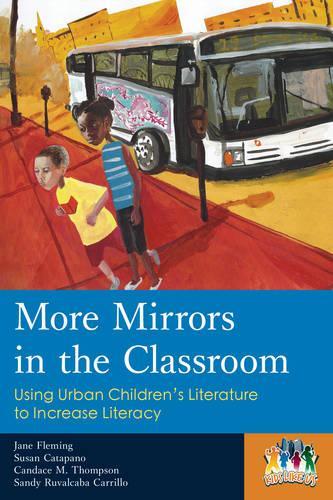
More Mirrors in the Classroom: Using Urban Children's Literature to Increase Literacy
(Hardback)
Available Formats
Publishing Details
More Mirrors in the Classroom: Using Urban Children's Literature to Increase Literacy
By (Author) Jane Fleming
By (author) Susan Catapano
By (author) Candace M. Thompson
By (author) Sandy Ruvalcaba Carrillo
Bloomsbury Publishing PLC
Rowman & Littlefield Publishers
8th June 2016
United States
Classifications
Professional and Scholarly
Non Fiction
Educational: First / native language
Childrens and teenage literature studies: general
372.6
Physical Properties
Hardback
252
Width 158mm, Height 239mm, Spine 24mm
540g
Description
Nearly 30% of all public school children attend school in large or mid-size cities, totaling more than 16 million students in 22,000 schools. For schools serving culturally and linguistically diverse populations and large numbers of children living in poverty, a significant achievement gap persists. Proponents of multicultural education often advocate for instruction with culturally relevant texts to promote inclusion, compassion, and understanding of our increasingly diverse society. Less discussion has focused on the significant body of research that suggests that culturally relevant texts have important effects on language and literacy development. By connecting the dots of existing research, More Mirrors in the Classroom raises awareness about the critical role that urban children's literature can play in helping children learn to read and write. In addition, it provides practical step-by-step advice for increasing the cultural relevance of school curricula in order to accelerate literacy learning.
Reviews
Starting with the statement that 'children use languages and experiences that are familiar to them to recognize words, understand texts, and tell stories,' this volume quickly sheds light on a fundamental oversight: when producing titles for mainstream audiences, many publishers omit urban settings and communities. The authors seek to encourage those who work with young children to become aware of the many benefits of using literature that depicts positive images of urban life to engage students and bolster their literacy development. Beginning chapters support research that urban childrens literature, both fiction and informational, can impact students motivation to learn. Studies are cited, showing that when children are exposed to scenarios with which they can identify, more meaning can be derived from the readings. The authors present a case for making urban titles a subgenre of multicultural literature, arguing that it portrays specific settings and situations that highlight the socioeconomic and cultural realities of childrens daily city life. This work offers guidelines for selections as well as a caution to use culturally authentic materials. Readers will appreciate information on how to transform the curriculum and the advice on how to start adding 'more mirrors' to the classroom or library. A comprehensive list of recommended books rounds out the volume, and dual language learners are covered as well. Verdict: Whether they serve diverse populations or not, librarians will find this an excellent addition. * School Library Journal *
More Mirrors in the Classroom is a well-written and needed addition to the library of educators, filling a gap in the professional literature. It is a user-friendly resource that stimulates thinking and calls for creativity and flexibility on the part of educators, while fulfilling a scholarly mission as a professional resource. It is a useful resource for those already in the field and may be useful in teacher training programs. * PsycCRITIQUES *
More Mirrors in the Classroomis a comprehensive, thoughtful and respectful text that underscores the literacy practices of city-based children and teens as competent readers of their own lives and experiences. The text conveys an insightful explanation of the ways in which educators must consider the nuances of urbanity as a knowledge base for city children when selecting texts and building classroom and library book collections for urban schoolchildren. More Mirrors in the Classroomfurther encourages educators to reflectively consider their own diverse identity construct as a foundation upon which a fully open approach to multi-cultural literature can become a normative pedagogical framework from which truly connective and edifying teaching can emerge. The text offers important step-by-step suggestions that allow educators a solid start towards competently embracing urban children's literature for the classroom, library, and beyond. This text is a musthave resource for pre-service and veteran educators everywhere. -- Vanessa Irvin, Ed.D., author, "The Readers Advisory Guide to Street Literature"
Building on culturally relevant pedagogical tenets, insights, and practices, More Mirrors in the Classroom: Using Urban Children's Literature to Increase Literacy provides guidance and a wealth of resources which reflect and affirm the realities and lived experiences of urban youth, families, communities, and perspectives. Accessible to practitioners and teacher educators alike, this poignant and engaging book is a much-needed addition to the knowledge base. -- Gloria Boutte, Ph.D., distinguished professor, University of South Carolina, author "Multicultural Education: Raising Consciousness"; "Resounding Voices: School experiences of people from diverse ethnic backgrounds"; and "Educating African American students: And how are the children"
Author Bio
Jane Fleming is a reading specialist with more than 20 years experience working in urban public schools in Chicago, St. Louis, and Washington, D.C. She is co-founder of KIDS LIKE US, a nonprofit organization dedicated to research, professional development, and advocacy around teaching with culturally relevant texts. Susan Catapano is Professor and International Coordinator in the Watson College of Education at the University of North Carolina in Wilmington. She has a doctorate in higher education with concentrations in adult learning and early childhood education. Candace Thompson is an Associate Professor at the University of North Carolina in Wilmington, North Carolina. Her research interests include culturally sustaining applied learning in teacher preparation, and youth empowerment. Sandy Ruvalcaba Carrillo is a resource teacher of English learners in a school on the Southwest side of Chicago with 17 years of experience in education. She earned her undergraduate degree in bilingual/bicultural education from Western Illinois and completed a graduate degree in early childhood education at Erikson Institute.
